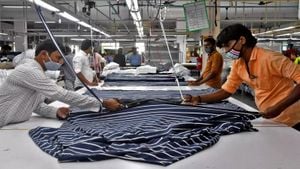Keir Starmer, the Prime Minister of the United Kingdom, is stirring the political waters with his latest actions and statements, particularly concerning immigration and climate policy. Recent statistics reveal some staggering truths: approximately seven million immigrants are currently filling jobs across the UK, making up about one-fifth of the labor force. This marks a significant shift since the onset of the Covid-19 pandemic, during which around 1.4 million non-EU workers arrived, offset by the departure of about 230,000 EU-born workers.
The surge in immigration has reignited discussions and concerns among politicians and citizens alike. Starmer has committed to reducing net migration, which recently peaked at 685,000—considerably higher than pre-pandemic figures of 200,000 to 300,000. The Labour government's initiatives, including empowering the Skills England body, aim to bolster the UK’s workforce skills and reduce dependence on foreign labor.
Critics, including industry experts, express skepticism. Alp Mehment from Migration Watch contends the UK job market remains open to foreign workers, with critics arguing Labour's plans are insufficient to steer businesses away from hiring cheaper, overseas help. Robert Bates of the Centre for Migration Control reiterated concerns over businesses hiring foreign labor when domestic options are available, urging significant shifts to secure high wages and skilled jobs for locals.
Simultaneously, the Migration Observatory at the University of Oxford anticipates net migration to decline, attributing this trend to the emigration of international students who had previously flocked to the UK. This perspective suggests the migration narrative will naturally evolve irrespective of government policy shifts.
Another significant aspect of Starmer's political posture is his recent declaration on climate action. He announced ambitious plans to cut UK greenhouse gas emissions by 81% by 2035. This target aligns with recommendations from the Climate Change Committee and echoes existing commitments on reducing emissions from 1990 levels, which are key to international climate negotiations.
During the recent COP29 talks held in Azerbaijan, Starmer emphasized the importance of leading by example, citing the UK’s potential role as a clean energy trailblazer. He noted, "The race is on for the clean energy jobs of the future, the economy of tomorrow," framing this shift as not just necessary for the environment but also economically beneficial.
Nevertheless, Starmer assured the public he does not intend to dictate personal lifestyle choices to achieve these emission targets. He emphasized the need for partnership and cooperation, striving for global consensus rather than enforcing behavioral mandates on citizens. His approach aims to balance effective climate measures without imposing perceived burdens on everyday life.
Facing renewed scrutiny, Starmer’s political maneuvers have also met with resistance from various activism groups. A particularly heated issue involves the future of the Chagos Islands, with accusations from activists claiming Starmer is sidelining the Chagossian community and their right to self-determination. Reports emerged of protests organized by the Friends of British Overseas Territories expressing outrage over the government's decision to cede control of the islands back to Mauritius.
Maxwell Evenor, representing Chagossian interests, condemned the government's handling of the situation, spotlighting the apparent lack of dialogue with affected communities. The timing of these actions could be precarious, especially with Nigel Farage, former UKIP leader, reportedly leveraging his relationship with Donald Trump to sway public opinion against the deal.
Farage's ties to influential figures suggest potential international ramifications for UK politics, particularly as the new administration takes office next year. Upcoming interactions with the Trump administration may complicate the UK's foreign policy, especially concerning the Chagos Islands and the presence of Chinese interests if control is fully handed over to Mauritius.
Starmer's government will need to navigate these turbulent currents carefully, as tensions escalate within the Labour party and across the political spectrum. Critics assert the Prime Minister's approaches to both migration and climate change are not just pivotal for addressing immediate concerns but could shape political dynamics for years to come.
Back at the domestic front, Starmer engaged opposition leader Kemi Badenoch during recent PMQs, where he dodged direct questions about his council tax policies, opting instead to highlight the significance of his recent climate summit engagements. This evasiveness might fuel speculation about his administrative consistency and transparency moving forward.
The Prime Minister's ambitious climate goals, aiming for infrastructure shifts like phasing out gas boilers by 2033, could be compelling campaign fodder for conservative opponents, who criticize these ambitions as unrealistic and economically damaging for British taxpayers.
With climate emergencies worsening globally, Starmer's ability to implement comprehensive, effective policies without alienation of the electorate will be tested. The stakes have never been higher for him to balance climate advocacy with the needs and sentiments of those he leads.
While net migration and climate objectives are two starkly different issues, both present complex challenges for the Prime Minister as he seeks to reinforce Labour's position within the UK political arena. Each stance he takes could significantly influence the voter base, especially with general elections looming on the horizon.



